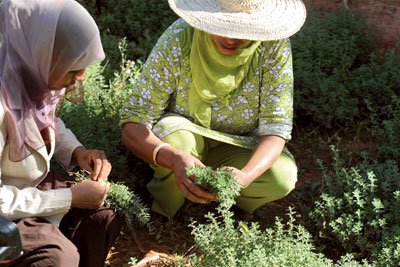Women Championing Climate Resilience in MENA
By Leen Hayek
The impact of climate change is acutely felt across the Middle East and North Africa (MENA) region, with rising temperatures, water scarcity, and increased frequency of extreme weather events posing serious threats to individuals and their livelihoods. Many climate narratives are now framing the MENA region as being on the path to an apocalyptic climate future. Headlines like “The Middle East Is Becoming Literally Uninhabitable” and “Climate change is making the Arab world more miserable” are more frequently circulated. While apocalyptic narratives should be considered with a grain of salt, after living in the Middle East over the past few years, one cannot disregard the tangible impact climate change and environmental degradation have had on the region.
Evidence suggests that “the Middle East is warming at twice the global average” and that the region is at higher risk for extreme weather patterns. In this harsh climate reality, women are disproportionately affected due to existing gender inequalities and their frontline roles in sectors like agriculture and domestic water management. However, women in the MENA region are also emerging as powerful agents of change, leading grassroots adaptation efforts, driving policy advocacy, and pioneering sustainable entrepreneurship ventures.
Morocco’s Desert Oases
Through the support of UN Women, women living near oases in rural Morocco are working to safeguard these fragile ecosystems from desertification while generating an income through the cultivation of medicinal and aromatic plants. The value of these women’s agricultural practices is tremendous: it supports protecting the soil around the oases from degradation, thus supporting the conservation of these ecosystems, on which 90% of the local agriculture-based economy depends; it encourages a shift into higher-value crops with lower water requirements in the local community; and finally, it supports women in generating incomes and achieving financial independence. These women have gone on to start cooperatives and cooperate with NGOs and economic interest groups to commercialize their products and bring them to market.
Moroccan women cultivating medicinal herbs around desert oases. Image source: UN Women Morocco
Moroccan women cultivating medicinal herbs around desert oases. Image source: UN Women Morocco
Across the MENA region, farmers are battling droughts, frosts, and extreme weather patterns at unprecedented rates. At best, farming communities manage to sell crops at sub-optimal prices; at worst, farmers lose entire crops. The plight of farmers conjures up that of another community who rely on pastoral land—the Bedouins.
Jordan’s First Female Solar Engineer
Bedouins, the Arabic-speaking nomads of the Middle East, are animal herders who spend their lives in cyclical migration between cultivated lands in the summer months and the desert during the winter. Over the course of the 20th century, many Bedouins across the Arab World have abandoned their nomadic lifestyles due to political disturbances and socio-economic pressures, among others. As pastoral lands continue to shrink, this overlooked segment of the community is left at the mercy of climate change, often without the welfare benefits provided to society members.
Herein comes Rafea Um Gomar, who grew up in a rural, vulnerable Bedouin community and became Jordan’s first female solar engineer. Through the support of a development program, Rafea was able to attend Barefoot College International, which trains rural women to become solar engineers, thus empowering them to provide a source of clean, decentralized electricity to their communities. With the support of her family, Rafea defied norms by attending the program and went on to install more than 80 solar lighting fixtures across her community. In doing so, not only did she support her community in becoming more climate-resilient, but she also became a multiplier, training other women in her community to do the same.
Much like Rafea and the women of Morocco’s Errachadia region, numerous women entrepreneurs and trailblazers have taken the lead in making their communities more climate resilient within the MENA region. From Jordan’s Water Wise Women Plumber’s Cooperative defying gender roles to Egypt’s pioneering rural women driving the establishment of a water knowledge hub along the Nile, as the MENA region continues to grapple with the escalating challenges posed by climate change, the vital contributions and leadership of women in driving sustainable solutions and fostering community resilience will be imperative to forging a more equitable and climate-resilient future.
Egypt’s pioneering women responsible for the water knowledge hub. Image source: Louise Sarant, International Water Management Institute
Leen Hayek is a MALD student at The Fletcher School, Tufts University.




